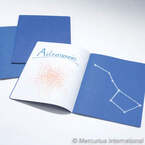- Unit Studies
- >
- Grade 6
- >
- Grade 6 Unit 7 The Wonder of Astronomy
Grade 6 Unit 7 The Wonder of Astronomy
SKU:
g6m7
CA$44.00
CA$44.00
Unavailable
per item
As students wake up more fully to their surroundings, not only do they study the ground they are standing on in grade 6, but they also look up to investigate the stars above. Through observation, sketching, and highlights of great astronomers, the wonder of the skies opens.
This purchase includes one month of curriculum and access to our members-only area with supporting documents, videos, resources, and community.
The Wonder of Astronomy
Curriculum Areas/Learning Outcomes
Language Arts: Concept: Exploring and sharing multiple perspectives extends our thinking.
Connection: Your child will learn about different cultures and their perspective on the stars above. This builds an appreciation for diversity as well as an understanding of our connection.
Social Studies: Concept: Systems of government vary in their respect for human rights and freedoms. Connection: Your child will gain an appreciation for the Indigenous knowledge and connection to astronomy, and the work being done to bring respect and honour to this age-old wisdom within the context of science.
Science: Concept: The solar system is part of the Milky Way, which is one of billions of galaxies.
Connection: Your child will learn about the constellations in the Milky Way, and experience night sky observations.
Math: Concept: Data from the results of an experiment can be used to predict the theoretical probability of an event and to compare and interpret.
Connection: Your child will work on probability math questions using the Grade 6 math workbook and online worksheets.
Connection: Your child will learn about different cultures and their perspective on the stars above. This builds an appreciation for diversity as well as an understanding of our connection.
Social Studies: Concept: Systems of government vary in their respect for human rights and freedoms. Connection: Your child will gain an appreciation for the Indigenous knowledge and connection to astronomy, and the work being done to bring respect and honour to this age-old wisdom within the context of science.
Science: Concept: The solar system is part of the Milky Way, which is one of billions of galaxies.
Connection: Your child will learn about the constellations in the Milky Way, and experience night sky observations.
Math: Concept: Data from the results of an experiment can be used to predict the theoretical probability of an event and to compare and interpret.
Connection: Your child will work on probability math questions using the Grade 6 math workbook and online worksheets.
Curriculum Overview
“Man by himself, insofar as he makes use of his healthy senses, is the greatest and most exact physical apparatus which exists.” -Goethe
In this unit, your child will discover the wonder of the human body as the greatest instrument of measurement.
Your child will discover the ability to use their upright vertical position as a way to orient their direction on Earth and among the stars. They will follow the movements of the stars and the moon with their eyes and use their arms to measure their angles. This unit will involve a commitment to regular observation of the night sky, and how the stars and moon move across the sky. Taking these observations back into the daily morning lessons, your child will be able to develop an understanding of a complete celestial globe and get their bearings in space defining “great circles” known as the horizon, meridian and celestial equator. Your child will observe the northern sky and gain an understanding of the circumpolar constellations and stars. Your child will develop an understanding of the relationship between the earth and sun, and why there are four seasons. Your child will observe the phases of the moon. They will connect ancient Greek myths and Indigenous stories to what they observe in the night sky.
During this unit your child will focus on probability activities. You may be able to use the Grade 6 math book you have for practice. Here is a website for further help. https://www.math-aids.com/Probability/
Examples of Probability Math Activities
Instructions: https://sites.google.com/gsuite.viu.ca/lahal-math-connections/the-game
In this unit, your child will discover the wonder of the human body as the greatest instrument of measurement.
Your child will discover the ability to use their upright vertical position as a way to orient their direction on Earth and among the stars. They will follow the movements of the stars and the moon with their eyes and use their arms to measure their angles. This unit will involve a commitment to regular observation of the night sky, and how the stars and moon move across the sky. Taking these observations back into the daily morning lessons, your child will be able to develop an understanding of a complete celestial globe and get their bearings in space defining “great circles” known as the horizon, meridian and celestial equator. Your child will observe the northern sky and gain an understanding of the circumpolar constellations and stars. Your child will develop an understanding of the relationship between the earth and sun, and why there are four seasons. Your child will observe the phases of the moon. They will connect ancient Greek myths and Indigenous stories to what they observe in the night sky.
During this unit your child will focus on probability activities. You may be able to use the Grade 6 math book you have for practice. Here is a website for further help. https://www.math-aids.com/Probability/
Examples of Probability Math Activities
- single-outcome probability events (e.g., spin a spinner, roll a die, toss a coin)
- listing all possible outcomes to determine theoretical probability
- comparing experimental results with theoretical expectation
- Lahal stick games (requires teams)
Instructions: https://sites.google.com/gsuite.viu.ca/lahal-math-connections/the-game
Materials Needed
- It's fun to have an Astronomy lesson book like this one from Maplerose which has a combination of pages to highlight the fun and creativity of studying astronomy. It includes white drawing paper and thicker dark blue pages, perfect for drawing the night sky with silver or gold roller ball pens or silver pencil crayons to make the stars stand out. See an example Astronomy learning portfolio here.
- Library books/online resources-Indigenous stories of the stars (find on Resource Hub)
- Grade 6 math workbook
- Chapter book for independent reading
- 2 hula hoops
- Compass
- Ruler
- Sketch book
- Beeswax –or firm modelling clay
- Night Sky app (optional)
|
|


